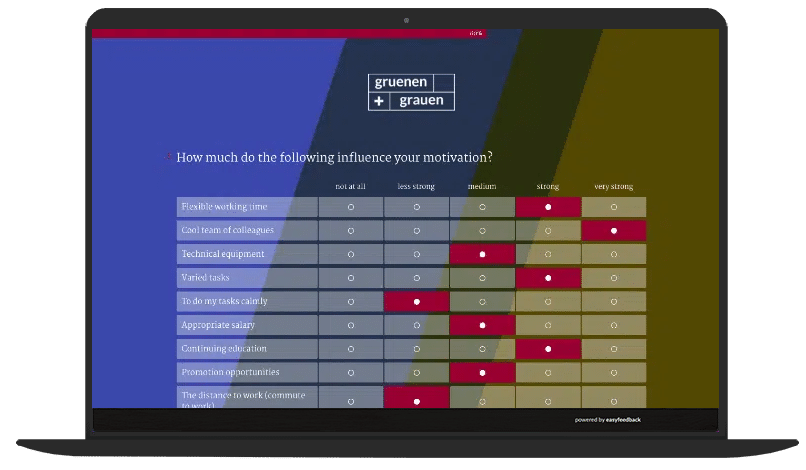Questionnaire
The first way to measure employee motivation is to use surveys.
Surveys are an easy way to look into the minds of your employees.
By asking specific questions, you can find out how motivated your employees are, which factors influence their motivation and what opportunities there are to improve it.
In addition, analyzing the survey results allows you to derive targeted measures to increase employee motivation.
To create and conduct surveys, it is advisable to use a data protection-compliant survey tool such as easyfeedback.
With easyfeedback, you can ensure that the anonymity of participating employees is 100% technically guaranteed. As a result, employees can feel safe and will be more willing to give honest feedback.
In addition, easyfeedback already offers a ready-made survey template for measuring employee motivation. You can use this template and easily adapt it to your specific needs.
Simply sign up for easyfeedback for free.

Feedback meetings
Regular feedback meetings are another way of assessing the motivation level of employees. These meetings can take the form of individual or group discussions and do not have to take up a lot of time.
During these meetings, the individual needs, wishes and sources of motivation of the employees can be asked. This gives the line manager a better understanding of the individual motivational factors of each employee.
In addition, feedback meetings offer the opportunity to address possible obstacles or sources of frustration. This allows employees to openly address their challenges and difficulties, which enables the line manager to take targeted measures to eliminate or minimize these obstacles.

Furthermore, feedback meetings make it possible to review the effectiveness of measures already taken to motivate employees. Employees can give feedback on whether certain measures have had a positive impact on their motivation or not.
This allows the line manager to recognize which measures were successful and which may need to be adjusted or replaced.
Last but not least, feedback meetings create a culture of open communication between employees and managers. This promotes employee commitment and enables a continuous exchange on motivation issues.
Through dialog, both employees and managers can learn from each other and work together to improve employee motivation.
Key figure analysis
The third way to measure employee motivation is to analyze personnel and performance indicators. I would like to briefly explain three key figures as examples:
- Turnover rate
A high turnover rate can be an indicator of low employee motivation.
If many employees leave the company, this indicates that they are dissatisfied or demotivated.
By analyzing the turnover rate, companies can identify whether there are problems with employee motivation and take appropriate measures. - Sickness rate
A high sickness rate can be another indication of low employee motivation.
If employees are frequently ill or call in sick more often, this can be a sign that they are demotivated or dissatisfied.
Here too, analyzing the sickness rate can help to identify possible causes of demotivation and take appropriate measures to improve motivation. - Performance indicators
Analyzing performance indicators such as productivity, quality of work or target achievement can also provide information about employee motivation.
If performance results fall short of expectations, this may indicate that employees are not sufficiently motivated.
Tip: One key figure alone does not measure the motivation of your employees. Bear in mind that the options I have presented only provide a meaningful picture when used in combination and continuously. Therefore, use and measure motivation with different KPIs.

Conclusion: Strengthen employee loyalty – Increase performance
In this article, we have learned about the options for measuring employee motivation.
But why is it so important to measure it in the first place?
The answer is simple:
Measuring employee motivation is an important step in continuously improving employee performance and satisfaction.
By recording motivation, we can become aware of problems at an early stage and take targeted measures to counteract them.
A high level of employee motivation not only leads to increased productivity, but also to greater loyalty to our company and a positive working atmosphere.
Ultimately, this contributes significantly to increasing customer satisfaction and ensuring the long-term success of our company.
For this reason, we strongly recommend that you regularly measure employee motivation and introduce appropriate measures to improve it.
I hope that this explanation has made it clear to you why it is so important to measure the motivation of your employees and has also given you some inspiration on how you can implement this successfully.
More on the topic of employee motivation
- 10 tips for increasing employee motivation
- Everything you need to know about employee motivation!
- 10 examples and methods for motivating your employees
- 6 Consequences of a lack of employee motivation
- Employee motivation through leadership: approaches and strategies
- Motivational skills for entrepreneurs and managers: The engine for sustainable success




